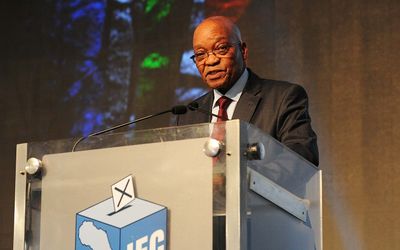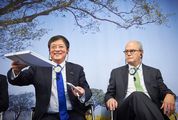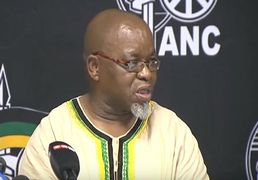IF THIS year’s election result were a modest showing for the African National Congress (ANC), President Jacob Zuma did not get the memo. During a Johannesburg victory rally, just hours after the declaration of the election results in Pretoria, President Zuma said the ANC’s performance at this year’s elections was a "historic" one.
The ANC under Mr Zuma has faced arguably its most difficult election yet, which came amid a whirlwind of scandals, controversies, an underperforming economy, negative perceptions of service delivery, unemployment and labour unrest in the platinum mining sector. Despite this quandary, the ANC received a majority vote of 62%.
However, the governing party’s support dropped in terms of voter numbers — 1.6-million in 2009 to 1.4-million this year — dipping from the 66% showing of 2009. The party also registered a considerable dip in its Gauteng provincial results, from 64% in 2009 to 53% this year. It also lost some support in areas considered as "hot spots" for service delivery protests, prone to election-related violence.
This downward trend did not stop the ANC from shutting down the Johannesburg city streets surrounding Luthuli House to celebrate the results. A huge crowd of ANC supporters filled a nearby park, waiting to hear Mr Zuma speak. Mr Zuma arrived from the Electoral Commission of South Africa’s official announcement of election results in Pretoria.
He said the victory was significant because the ANC won the national poll in spite of what he called negative campaigning by opposition parties and "a barrage of propaganda" from mainstream media.
"Something that always puzzles many people, except for the ANC and its alliance, is they cannot figure out why the ANC always wins with a majority. The elections this time saw a concerted effort to campaign against the ANC. (It was a) negative campaign to paint the ANC into an organisation we don’t know," Mr Zuma said.
Mr Zuma said opposition parties were bereft of sound plans and policies and, as such, had resorted to discussing his homestead upgrades in Nkandla, KwaZulu-Natal, during the election campaign.
"There is nothing wrong with Nkandla, there is something wrong with them. The ANC and the alliance knows politics. When we campaigned we did door to door — not a single person asked us about Nkandla. The media spoke among themselves, saying the people were angry about Nkandla," Mr Zuma said.
Mr Zuma said the party would begin taking steps to speed up economic and social transformation in the country.
"We must start the work of speeding up change. We have clearer policy, programmes and plans that our people understand. We are working to quicken the pace of delivery in the next administration. Those deployed will work hard and those who don’t work hard will have no reason to stay in deployment," Mr Zuma said.
South African National Civic Organisation CEO Sikhumbuzo Mpanza said: "Our people are not stupid. Never undermine our intelligence. They lie to our people and say the ANC has never delivered. They wanted you to not vote for the ANC, but because you are not stupid you put the ANC back in power."
National Executive Committee member Malusi Gigaba said the ANC was more grateful for the 11.4-million votes it received at the polls than it was concerned with the loss of votes in Gauteng and protest hotspots.
"When you have received as much support as we have in this year’s elections, you cannot be ungrateful and complain about the two or three percent that you did not get. What we will do with regards to those areas is that we will go back to those communities and say we understand and will address the issues that affect them," Mr Gigaba said.

President Jacob Zuma delivers a speech during the announcement of the final results for the 2014 national and provincial elections at the Electoral Commission of South Africa’s command centre in Pretoria on Saturday. Picture: GCIS
IF THIS year’s election result were a modest showing for the African National Congress (ANC), President Jacob Zuma did not get the memo. During a Johannesburg victory rally, just hours after the declaration of the election results in Pretoria, President Zuma said the ANC’s performance at this year’s elections was a "historic" one.
The ANC under Mr Zuma has faced arguably its most difficult election yet, which came amid a whirlwind of scandals, controversies, an underperforming economy, negative perceptions of service delivery, unemployment and labour unrest in the platinum mining sector. Despite this quandary, the ANC received a majority vote of 62%.
However, the governing party’s support dropped in terms of voter numbers — 1.6-million in 2009 to 1.4-million this year — dipping from the 66% showing of 2009. The party also registered a considerable dip in its Gauteng provincial results, from 64% in 2009 to 53% this year. It also lost some support in areas considered as "hot spots" for service delivery protests, prone to election-related violence.
This downward trend did not stop the ANC from shutting down the Johannesburg city streets surrounding Luthuli House to celebrate the results. A huge crowd of ANC supporters filled a nearby park, waiting to hear Mr Zuma speak. Mr Zuma arrived from the Electoral Commission of South Africa’s official announcement of election results in Pretoria.
He said the victory was significant because the ANC won the national poll in spite of what he called negative campaigning by opposition parties and "a barrage of propaganda" from mainstream media.
"Something that always puzzles many people, except for the ANC and its alliance, is they cannot figure out why the ANC always wins with a majority. The elections this time saw a concerted effort to campaign against the ANC. (It was a) negative campaign to paint the ANC into an organisation we don’t know," Mr Zuma said.
Mr Zuma said opposition parties were bereft of sound plans and policies and, as such, had resorted to discussing his homestead upgrades in Nkandla, KwaZulu-Natal, during the election campaign.
"There is nothing wrong with Nkandla, there is something wrong with them. The ANC and the alliance knows politics. When we campaigned we did door to door — not a single person asked us about Nkandla. The media spoke among themselves, saying the people were angry about Nkandla," Mr Zuma said.
Mr Zuma said the party would begin taking steps to speed up economic and social transformation in the country.
"We must start the work of speeding up change. We have clearer policy, programmes and plans that our people understand. We are working to quicken the pace of delivery in the next administration. Those deployed will work hard and those who don’t work hard will have no reason to stay in deployment," Mr Zuma said.
South African National Civic Organisation CEO Sikhumbuzo Mpanza said: "Our people are not stupid. Never undermine our intelligence. They lie to our people and say the ANC has never delivered. They wanted you to not vote for the ANC, but because you are not stupid you put the ANC back in power."
National Executive Committee member Malusi Gigaba said the ANC was more grateful for the 11.4-million votes it received at the polls than it was concerned with the loss of votes in Gauteng and protest hotspots.
"When you have received as much support as we have in this year’s elections, you cannot be ungrateful and complain about the two or three percent that you did not get. What we will do with regards to those areas is that we will go back to those communities and say we understand and will address the issues that affect them," Mr Gigaba said.














 News, views and analysis of South Africa's national and provincial elections
News, views and analysis of South Africa's national and provincial elections














Change: -0.67%
Change: -0.74%
Change: -2.14%
Change: -0.47%
Change: -0.11%
Data supplied by Profile Data
Change: -1.44%
Change: -0.40%
Change: -0.67%
Change: 0.00%
Change: -0.56%
Data supplied by Profile Data
Change: 1.32%
Change: 1.37%
Change: 1.07%
Change: 1.10%
Change: 1.40%
Data supplied by Profile Data
Change: 0.11%
Change: -0.31%
Change: 0.26%
Change: -1.21%
Change: -2.22%
Data supplied by Profile Data